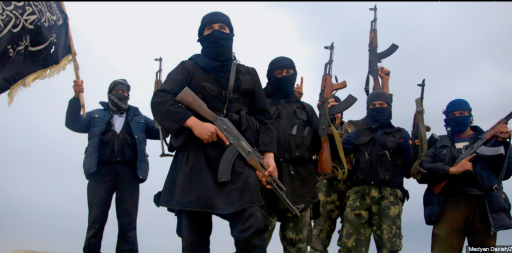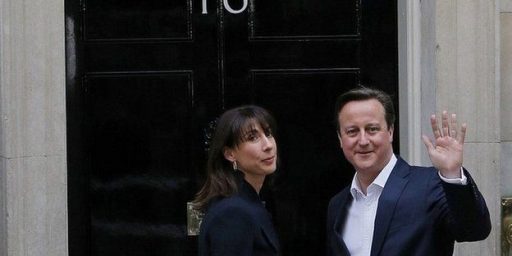What Does “Linked to Terrorism” Mean?
A question occurs in response to Doug Mataconis’ post this morning: what does "linked To terrorism" mean?* After all, we often want to know if a given act of violence is “terrorism” or not (and we seem, collectively, to react differently if an act is “terrorism” or not).
If an armed individual holds hostages because they are depressed or mentally disturbed, but do not articulate a specific philosophy or motivation, is that terrorism if they use that violence to make some kind of demand?
Is a demand necessary?
Is an ideology necessary?
If the person kills five but says nothing, what is that?
If a person kills five but says “Allahu Akbar” what is it then? What if they yell “cthulhu fhtagn“?
Was Sandy Hook terrorism? Was James Holmes a terrorist?
It seems to me that we casually (overly so) use the term “terrorism” these days to mean “Islamic extremism.” As such, it may be fair to say that the gunman in Sydney was motivated by Islamic extremism, but exactly how is unclear at this point (the flag is not really enough to judge).
In terms of being “linked to terrorism” I would note that terrorism is a tactic, not an organization. If the violence in Sydney is being used to influence the government of Australia to change its policy in some way then it is fair to call it a terrorist act. However, that does not necessarily mean that the individual is linked to a broader group (save, perhaps, in his own mind). From a policy (and reporting) point of view, it seems to me that it is important to distinguish between individuals and groups.
For example: if this individual is an actual agent of Daesh (or some other group), that would mean one thing. However, if the individual is acting on his own that is a different issue, yes?
What if a person simply thinks they are acting for a greater cause, but really are just mentally disturbed, what is that?
Is it simply “terrorism” if the perpetrator can be linked (by name, by heritage, etc.) to Islam?
What, ultimately, is the purpose (and usefulness) of using the label?
Thoughts?
—-
*I am not picking on Doug—I think this is a common response.




It’s a fair question. For the record, i chose to put that in the post title because that’s the way it is being reported in the media and because the demand for something like an ISIS flag, which the hostage taker apparently demanded early on, is at least indicative of an incident that has something to do with Islamist ideology.
At the moment, as with the situation in Canada earlier this year, it seems like we’re dealing with a lone wolf situation rather than something organized from outside. Those types of attacks seem to be becoming more common, and are reportedly a large concern for law enforcement because they’re so hard to predict. The Boston Marathon bombing, for example, was arguably a “lone wolf” attack.
In any case, I’m not sure what else to call something such as this. It’s different from the 9/11 attacks, obviously, but there are at least inspirational links between these types of attacks and organizations such as ISIS so they certainly ought to be considered something more than just an ordinary criminal act.
@Doug Mataconis:
Fair enough (and as I noted, I was not trying to pick a fight, or even criticize you specifically). I am really thinking in terms of a media/public response to these things.
@Doug Mataconis:
If it was a Klingon flag in the window, would you be inclined to call it terrorism?
(I am not being sarcastic).
@Steven L. Taylor: “If it was a Klingon flag in the window, would you be inclined to call it terrorism?”
And maybe more to the point, what if it was an American flag? Or a Gadsden flag?
@wr: Indeed.
Part of my point for going fictional is that the clear reaction would be “he’s crazy.” (but if there is hint of Islam then “he’s a terrorist”).
Well, crazy or not, his intentions appear to be to support the Islamic cause (which engages in terroristic activity to advance the cause) and to try to get into a public debate with the head of government. That seems to be a pretty good link to this being devised to influence government or the populace.
It seem quite obvious his goal is not mercenary (robbery) only, not targeted toward a personally known individual or organization, nor random without seemingly logical purpose (as one might expect of the insane).
This guy is crazy.
Seems to me that the default assumption when only one person is involved should be that he (pretty much always a he) is crazy. As Steven is saying, the terrorism thing only seems to come into play when the person is Moslem, or Moslem-looking.
I would say that activity, membership, visits, or contacts to Muslim brotherhood and questionable, suspicious places.
If it were a Confederate flag would you call it racism?
@TastyBits:
Very possibly.
But then again, “racism” is an attitude or an idea but “terrorism” is a tactic (and one that suggests a broader connectivity with some group or movement).
The flag at the cafe certainly suggests an Islamic connection.
Is this terrorism?
https://twitter.com/FelicityBarrTV/status/544515353540583424
Well.
@Steven L. Taylor:
The word terrorism is used to mean an organized group that uses terrorist methods to achieve their goals. It is easier to use a single word.
The word is often misused because the person “linked to terrorism” is not linked to an organization, or the link is tenuous – lone wolf. The person misusing the word is trying to terrorize people to achieve a goal.
@PJ: (Mouthing in silence) Asian Dawn?
The media’s rule seems to be that it’s only a crazy lone wolf if the shooter is white.
A case in point: http://www.smh.com.au/world/antiimmigration-gunman-linked-to-extremist-christian-group-police-say-20141202-11y9j5.html
(Spoiler Alert: This item is by Ronald Bailey of Reason Magazine. If this this gets your knickers in a twist, just don’t read it.)
http://reason.com/archives/2012/07/10/predictive-policing-criminals-crime
As far as I can tell the common media usage is Muslim and crazy.
I can understand why law enforcement officials would want to know why a crime is being committed, as part of trying to get better at preventing or deterring crime. I don’t understand why anyone else would care, though. The act is the same, regardless of motive.
(I am bemused, for example, that there seem to be a lot of people who object strenuously to distinguishing “hate crimes” from other crimes, but object equally strenuously to failing to distinguish “terrorism” from other crimes.)
Apparently Australians get that this was a crazy loner.
“#illridewithyou: hashtag offers solidarity with Sydney’s Muslims after cafe siege After concerns that people wearing Islamic dress could be harassed, Sydney locals have been using Twitter to offer to travel with them.”
http://www.theguardian.com/australia-news/2014/dec/15/illridewithyou-hashtag-offers-solidarity-to-sydneys-muslims-after-cafe-siege
Early on he said that there were devices placed in four locations around Sydney and one of his demands was to speak to the prime minister on tv and radio. All that seems to add up to a politically motivated threat of deaths and possibly mass destruction in order to scare the Australian people out of participating in the fight against daesh. If all of that turns out to be true, then I think this is not just linked to terrorism, but it is terrorism. If the motivation isn’t to use fear to advance a political motive, such as removing Australia from the campaign against daesh, then I don’t think it qualifies.
@Dave Schuler:
In 2010 a guy crashed a plane into an IRS office in Austin TX. IIRC it was reported that staff on one of the networks debated whether to call it “terrorism”. The discussion didn’t turn on whether he was alone or had demands, but on the fact that he wasn’t Muslim.
IIRC, during the Troubles, members of the IRA were often referred to as “terrorists”, but extremist Protestant Unionists, while often described in disparaging terms, were rarely if ever labeled as “terrorists” even tho their tactics were identical.
Not sure if my memory is accurate, or if the reporting was colored by distance, or if my own recollections are colored by the fact that I was raised Catholic and so felt a certain affinity for the Irish Republicans.
(The 3 up votes tell me that there are at least 3 people who didn’t hear about Asian Dawn by reading about them in Time magazine. Yippie-kai-yai, motha……)
@JKB:
Ok, then was Joseph Stack, the man who flew a plane into the IRS building in Austin, “linked to the tea party”? He did hold a lot of tea party positions, so you could certainly say he “supported their cause.”
BTW, what is “Islamic cause”? Sounds like you are more or less saying all Muslims are terrorists or terrorist sympathizers.
I think this question boils down to the fact there’s really no formal “membership procedure” for terrorists. You basically just espouse some solidarity with the principles of some organization and there you are, “linked to terrorism.”
Then we’re really screwed. The Great Old Ones won’t put up with any of this crap – might as well have that last beer and watch it all burn.
Seriously though, “terrorism” is an almost meaningless word nowadays since its been abused, invoked, twisted and mauled to suit the speaker’s needs. If it causes you to feel terror, it’s terrorism by default. I defer to the master on this one:
Sometime ago I read somewhere a perfectly marvelous analysis of Al Qaeda and how they were getting little offshoots to sprout up in very different locations. The analyst pointed out that Al Qaeda was basically operating as a franchiser: a group of malcontents in location X would contact them, and Al Qaeda would provide them all sorts of information and materials, provided they acted in accordance with Al Qaeda overall goals.
(The McDonalds of jihad. What a thought. )
@OzarkHillbilly: No, you’re not inaccurate, only Provos were called terrorists at the time. My uncle left Belfast for New Zealand–at a significant cut in job rank and salary–at the time in response to my cousin’s declaration that he wanted to join the Ulster Defense Association (UDA) to fight “against the Provos.”
The UDA was never, in my recollection, referred to as “terrorist,” only “right wing paramilitary.”
My uncle declared that his reason to leave was “I will not sacrifice my children to this cause.” I have always been glad that things worked out well for him. Starting over at nearly 50 was a great risk. I’m not sure I would have been able to.